- Home
- Peter Ackroyd
Wilkie Collins Page 12
Wilkie Collins Read online
Page 12
By the middle of November they had arrived. Once more he was confronted by rain, a driving and tropical rain that obscured the sea and Vesuvius. He was tormented by hail and lightning, deafened by thunder, and narrowly missed a hurricane. When the rain abated it was succeeded by a hot and damp sirocco wind. These were not the ideal conditions for a rheumatic invalid. He visited the remnants of the English community whom he had met in the past, and noted that Naples had not changed very much in the interim. Urchins and deformed beggars and vagabond cabmen still occupied the streets; the fruit stalls and iced-water stalls stood on every corner; the inhabitants of Naples still conversed in shrieks and wild gestures, and the old smells of the city still lingered.
Now he decided that the climate was too “relaxing” for him; even the warmth was enervating, doing him more harm than good. His appetite was failing, and his foot was more painful. He was becoming exhausted and depressed. He decided to move on to Florence by way of Rome, but when he finally reached the capital at the beginning of December, he decided to stay. The dry, cold air did him good. He could walk for two hours at a stretch in the crisp atmosphere, with the north wind acting as a restorative. He remained here for three months.
In Italy his imagination was quickened. He had great hopes for an entirely new and different novel, and the ideas for it came to him in swarms. He wrote them down and then considered them in every light, but already the outline of the plot was clear to him. He knew what the ending would be. In Rome—on 8 January 1864—he celebrated his fortieth birthday. But, as he said, “I don’t feel old.” He had no respectable prejudices or regular habits; he did not sleep after dinner or avoid public amusements. In Rome, for example, he was going to the opera all the time. Yet in later years his contemporaries would notice that he seemed, and looked, older than he actually was.
They returned to London in March after an absence of four months. It was only now that Collins could properly work upon the new novel. At first he made only slow and hesitant progress; he had abstained from literary practice for a year and a half and, as he told his mother, “it is not wonderful that my hand should be out.” Yet at least he had made a start. So he made reasonable progress through the spring and early summer, gathering strength and confidence as he went along. The monthly numbers of the Cornhill offered an alternative to the more insistent weekly deadlines of All the Year Round, but Collins was still determined to keep at least three months ahead of the printer. He was also pleased to discover that he could write less; one monthly episode was equivalent only to two of the previous weekly episodes. His writing demands were thereby cut by a half.
He was a little distracted by the circumambient noise of Harley Street. Like many London streets it was festooned with musicians and assorted entertainments, including organs and bagpipes and bands. He contemplated a move to the more sedate and secluded neighbourhood of the Temple, but nothing transpired. In June he was able to submit the first part of the manuscript to George Smith; the first chapter, “The Travellers,” is set at the baths in Bad Wildbad he had so recently attended. It was the beginning of Armadale, one of the most dramatic and convoluted of all Collins’s narratives.
He wished to shift the setting to Norfolk, and so in August he took the train to Great Yarmouth; with his companions, Edward Pigott and Charles Ward, he also indulged in a little light sailing off the Norfolk coast. He inspected the Norfolk Broads, too, where “the shore lay clear and low in the sunshine, fringed darkly at certain points by rows of dwarf trees; and dotted here and there, in the opener spaces, with windmills and reed-thatched cottages, of puddled mud…while to the east a long, gently undulating line of reeds followed the windings of the Broad, and shut out all view of the watery wastes beyond.” This was Horsey Mere, a broad swept by the wind from the North Sea, which in the novel becomes Hurle Mere.
And then once more he succumbed to illness. He seemed to believe that he had been attacked by gout of the brain. “My mind is perfectly clear,” he told Pigott in September, “but the nervous misery I suffer is indescribable.” He was not sure if he would be able to continue with the novel, a delay that in itself would be a disaster. Beard himself could not decide when he would be able to work again. There is no such thing as gout of the brain, and it seems to be shorthand for severe mental anxiety. The “misery” of the nerves may have been further exacerbated by an over-liberal use of opium.
Yet the disaster was averted and the spell of nervous tension had abated by the following month. His mood was further lightened by the favourable response to the early chapters. Dickens’s sister-in-law, Georgina Hogarth, could not sleep until she had finished them and Collins reported to Charles Ward that “the Printers are highly interested in the story…it is no easy matter to please the printers.”
Armadale began its public life in the November issue of the Cornhill and, even as he continued work on the subsequent episodes, he once more became anxious and ill at ease; a specialist in nervous diseases, Charles Radcliffe, diagnosed the problem as one of “gouty irritation” and prescribed a regimen of exercise accompanied by a light diet. His essential purpose, like that of most doctors, was to reassure the patient. Nothing seriously wrong with you. No reason for any alarm about your work.
Charles Collins gave what was probably the more accurate diagnosis in calling it a case of inherited “Collinsian nerves.” He drew upon his own experiences to illuminate those of his brother. “When you are doing nothing you are pretty well but directly that you begin to work again…think you suffer.” He added that “to think about work at all, especially at moments of compelled inaction, as in bed for instance, is highly dangerous.” So the Collins brothers may both have been prey to night terrors. Beard gave him a cordial made up of quinine, acid and dandelion that seemed to help.
His general nervousness could not have been improved by a move of house at the same time. A few days before Christmas he and Caroline took up residence at 9 Melcombe Place, Dorset Square; it was approximately a quarter of a mile from Harley Street, on the other side of the New Road. Any pretence at marriage was dropped, and Caroline Graves appears both in the rate books and in the London street directories. Her name also now appears in Collins’s bank account at Coutts.
The work on Armadale was relentless, and he only managed short interruptions. He travelled to Paris for a week at the end of February 1865, where he spent much of the time at the theatre. He visited his mother in Tunbridge Wells. He went up to Great Yarmouth with Edward Pigott for the sailing. He took the chair at the twentieth anniversary festival of the Royal General Theatrical Fund, when at the end of almost every sentence he was applauded.
He visited Dickens at Gad’s Hill Place, where a fellow guest described how “poor Wilkie Collins who needs rest used to sneak off to the library and go to sleep with a cigar. Dickens pried him out and said, ‘None of this. No smoking in the library in the daytime—you must work at something.’ ” In a game of charades Dickens appeared with a black handkerchief on his head and a fire shovel in his hand to mimic the beheading of Charles I; Collins played the royal victim.
Frederick Lehmann gives a curious report of an evening party in London during this period. He noted that “the Dickens and Collins faction” were at a different end of the drawing room from “Society.” The reason was clear enough. Collins was living with his mistress at Melcombe Place while Dickens had divorced his wife in favour of an actress. The two novelists, despite their fame and success, were not quite respectable.
Collins finally completed Armadale in the spring of 1866, and he told his mother that he had never before been so moved and excited by any of his endings. He celebrated the event by going to Paris with Frederick Lehmann for a week and, in the warm weather, he was happy to be simply idle. He had discharged what he considered to be “heavy responsibility” in the face of great difficulties; he had come through.
It was published in two volumes by Smith, Elder at the end of May. It is the longest novel that Collins ever wrote, and the plot
is too detailed to be amenable to précis. You cannot turn a labyrinth into a straight path. The narrative moves in setting from the Norfolk Broads to Borough High Street, from Germany to the Isle of Man, from Madeira to Naples, from an abortionist’s clinic in Pimlico to a country house in Somerset; the incidents vary from a murder at sea to an attempted murder by poison gas. It begins with a deathbed confession of murder and ends with a suicide. It concerns two young men with the same name, a recurrent dream of fatality and terror, and a detective mystery. It is perhaps too full of incident to be finally satisfying, and by the end the reader has supped full of sensation. Yet T. S. Eliot remarked that it “has no merit beyond melodrama, and it has every merit that melodrama can have.”
It is chiefly remarkable for its female protagonist, Miss Gwilt, a consummate intriguer and adventuress who inveigles her way into the heart of one of the young men. “Should I be wrong…if I guessed that you have something on your mind—something which neither my tea nor my talk can charm away? Are men as curious as women? Is the something—Me?” She has been in turn a forger, a murderer, a thief, and a bigamist. One of her associates is Mrs. Oldershaw who, after peddling quack medicines, becomes the proprietress of the Ladies’ Toilette Repository, an establishment that is essentially a backstreet abortion clinic. She is a character rich in comic possibilities that Collins unfailingly exploits. Here is her advice to Lydia Gwilt. “You shall have the sleeping drops tomorrow. In the meantime, I say at the end what I said at the beginning—no recklessness. Don’t encourage poetical feelings by looking at the stars; and don’t talk about the night being awfully quiet. There are people (in observatories) paid to look at the stars for you; leave it to them.”
The climactic scene is set in a sanatorium on Hampstead Heath, where Mrs. Midwinter (aka Miss Gwilt) is about to administer poison gas to her husband’s closest friend, thus completing the air of vivid and almost hysterical melodrama that accompanies the complicated plot in which characters overhear secrets or lurk beneath opened windows. It is all a great adventure with Collins himself pulling the strings—gently here, tightly there, loosely somewhere else. He acts as a dispassionate observer; he sets the scene; he carefully describes the rooms in which the action is to take place; he introduces the characters one by one.
And there is a moment which anticipates the actions of a later detective, Lieutenant Colombo. It is given the name of “Pedgift’s postscript” when “the lawyer suddenly checked his exit at the opened door; came back softly to his chair, with his pinch of snuff suspended between his box and his nose; said ‘By-the-by, there’s a point occurs to me.’ ”
The novel, to use Collins’s own words in another context, is “held together by some mysterious connection, and was tending to some unimaginable end.” “I was wondering,” one character says, “if there is such a thing as chance.” But the world is not ruled by chance; it is ruled by fatality. The characters of this world come together by ones and twos, converging from widely different quarters, drawing slowly together in a sphere “which was soon destined to assemble them all, for the first and the last time in this world, face to face.” In Basil, for example, the villain becomes “the bearer of a curse that shall follow you” and “the instrument of a fatality pronounced against you long ere we met.”
The critics of Armadale were not uniformly respectful. The Spectator described its anti-heroine, Miss Gwilt, as “fouler than the refuse of the streets.” The Collins world “is peopled by a set of scoundrels qualified by a set of fools, and watched by retributive justice in the shape of attorneys and spies.” The reviewer in the Athenaeum complained that his characters “may live and breathe in ‘the sinks and sewers’ of society” but they should not be displayed in fiction.
A more allusive note was struck by a critic in The Saturday Review who noticed the “galvanic power” of Collins’s narrative and remarked that the characters are kept in motion by “the sheer force and energy of the author’s will.” In a period when the powers of mesmerism were being explored and applied for a variety of purposes, the idea of the novelist as mesmerist is significant. An account of No Name had remarked that “from the beginning of the first chapter of his work, he keeps his eye steadily fixed on the last. So long as you have his book open, you are spell-bound…the book enchains you, but you detest it while it enchains.” The “chain,” as we have observed, is one of the key metaphors of Collins’s fiction—the chain of events, the chain of connections, the chain binding the reader to the tale. This mesmeric power can be associated with Collins’s interest in clairvoyance and animal magnetism together with the other hidden powers of the mind. The workings of “Destiny” may come in different forms.
CHAPTER THIRTEEN
The Stone
George Smith never did recoup the £5,000 he had offered Collins for the manuscript of Armadale; after some initial enthusiasm, sales were slow. Yet Collins refused to be downhearted and at a later date told one correspondent that he considered it to be the best novel he had ever written. Then he went yachting once more with Edward Pigott with the help of a steady breeze and a smooth sea.
It may have been on this short vacation that he and Pigott decided to make an extended journey to Italy. Before he left, however, he had accepted a proposal for the revival of The Frozen Deep by a professional company at the Olympic. Since it was imperative to leave for Italy on the date they had set, Collins was in a frantic rush of business made all the more wearying by a bad cold. Originally the play had been scheduled for the Christmas season but the failure of another production brought it forward to October. He read the play to the cast and even supervised the early rehearsals. He had hoped to use the original sets, but they had all been cut apart. He broke off to visit his mother at Tunbridge Wells and then hurried back to the theatre to sketch the playbill and talk to the manager.
Then he was off to Italy. He managed to spend a day in Paris where he spoke to the manager of the Théâtre Français, François Regnier, about a production of Armadale. He and Pigott then travelled through Switzerland to Milan and Rome; Pigott was now the chief reporter on foreign affairs for the Daily News, and he wanted the opportunity to see for himself the complications of Italian politics at the time when the Venetian republic was about to be absorbed by the recently created kingdom of Italy. Collins’s own visit, however, was curtailed when he received a letter from his French collaborator on the play of Armadale who needed urgent advice. On the same day a letter also arrived from London which gave him the unwelcome news that The Frozen Deep had not been a success at the Olympic; the audience on the opening night had been enthusiastic enough, but ticket sales had not been high. The play was considered “slow,” and perhaps a little old-fashioned for a modern public. The London Review had described the characters as “mere sketches,” and the costumes as “unnatural and ridiculous.”
So he travelled to Paris as quickly as possible, where he sorted out the problems of the collaborator, before going on to London for discussions with Horace Wigan of the Olympic. In truth The Frozen Deep was never going to be a success, and it was taken off after a “run” of six weeks. It was said that there had even been hisses from the audience at some of the performances. Collins told one of the actresses that it had all been “disastrous.” A few months later, too, Collins was told by Regnier that Armadale could not be produced on the French stage. Collins had harboured hopes for its production in London, too, but it was never performed there in its original form.
Collins had great expectations of the theatre. He believed that he could make a fortune by it, in London and in Paris, and he always said that his creative gift was essentially a theatrical one. Soon enough he was planning his narratives with eventual stage production in mind, in effect turning them into quintessentially theatrical novels. On a personal rather than a professional level, many of his friends were actors; he had a taste for green-room gossip, and he enjoyed the company of men and women who were immune to many of the Victorian pieties. He even harboured the ambition of
becoming a theatrical manager.
His own taste in drama was wide enough, with a particular attention to the French theatre of Dumas and of Scribe. In England he was less hopeful and respectful, considering most English acting to be third-rate and the English public to be imbecilic. Nevertheless he tried repeatedly for success, and at one stage of his career three of his plays were performed in the West End within a space of eighteen months. He had a preference for melodrama in a period when, according to one observer, theatrical success relied upon “the most prodigious excitement, the most appalling catastrophes, the most harrowing situations.” His own practice is reflected in his tribute to the actor Charles Fechter, when he declared that “an audience cannot be excited without being thrilled. It cannot be thrilled without being made to feel…”
At the beginning of 1867, undeterred by the relative financial failure of Armadale, he found a fresh source of optimism. He wanted to discover a new public, and had decided that he would begin to write for the penny journals. He was bursting with ideas for new books and new plays. He even conceived a scheme for combining the plots of The Lighthouse, The Frozen Deep and The Red Vial into one novel for the penny public; it is probably just as well that he never managed to achieve this feat.
But he did soon have the notion of a new and thoroughly original novel. By the spring he was negotiating terms with All the Year Round for its appearance in weekly numbers. He had clearly decided that the penny public was not yet ready for him. He took the first three parts with him to Gad’s Hill Place in the summer and, when he read them aloud, Dickens was much taken by the plot. Dickens told Wills that “it is a very curious story, wild and yet domestic,” and he believed that “it is in many respects much better than anything he has done.” Two weeks later Collins reported to his mother that he was “in a whirl of work.” Collins had planned to make the new novel much shorter than Armadale, and although it ran longer than he intended, it was still only three-quarters of the length of its predecessor.

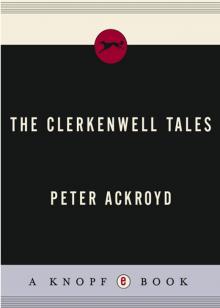 The Clerkenwell Tales
The Clerkenwell Tales The Canterbury Tales
The Canterbury Tales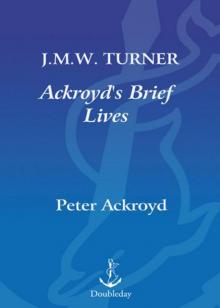 J. M. W. Turner
J. M. W. Turner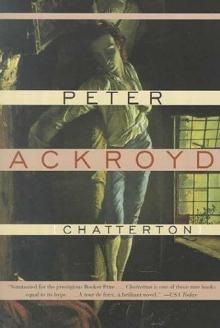 Chatterton
Chatterton The Canterbury Tales – A Retelling
The Canterbury Tales – A Retelling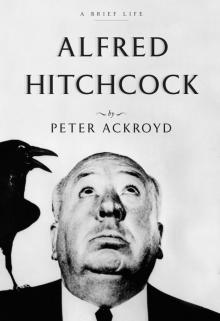 Alfred Hitchcock
Alfred Hitchcock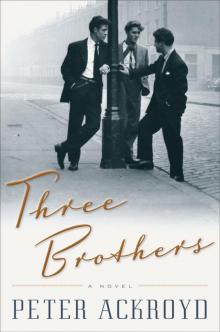 Three Brothers
Three Brothers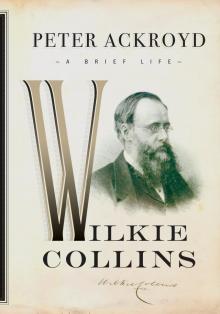 Wilkie Collins
Wilkie Collins Venice
Venice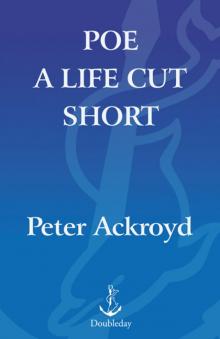 Poe
Poe The Lambs of London
The Lambs of London London
London Queer City
Queer City Revolution, a History of England, Volume 4
Revolution, a History of England, Volume 4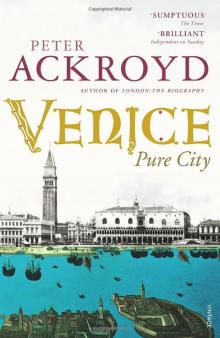 Venice: Pure City
Venice: Pure City Foundation
Foundation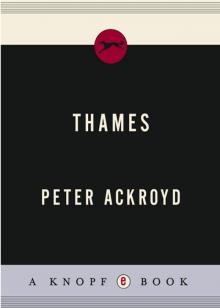 Thames
Thames The Plato Papers
The Plato Papers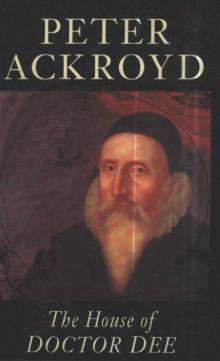 The house of Doctor Dee
The house of Doctor Dee Rebellion: The History of England from James I to the Glorious Revolution
Rebellion: The History of England from James I to the Glorious Revolution Albion: The Origins of the English Imagination
Albion: The Origins of the English Imagination The Fall of Troy
The Fall of Troy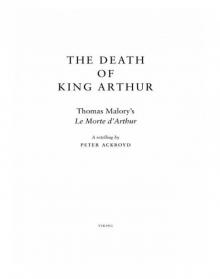 The Death of King Arthur
The Death of King Arthur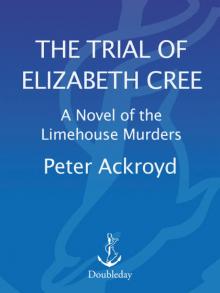 The Trial of Elizabeth Cree
The Trial of Elizabeth Cree London: The Biography
London: The Biography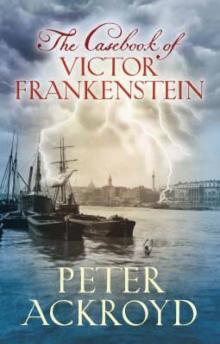 The Casebook of Victor Frankenstein
The Casebook of Victor Frankenstein Hawksmoor
Hawksmoor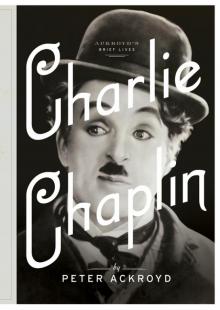 Charlie Chaplin
Charlie Chaplin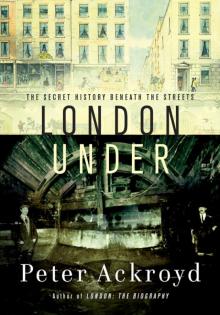 London Under
London Under